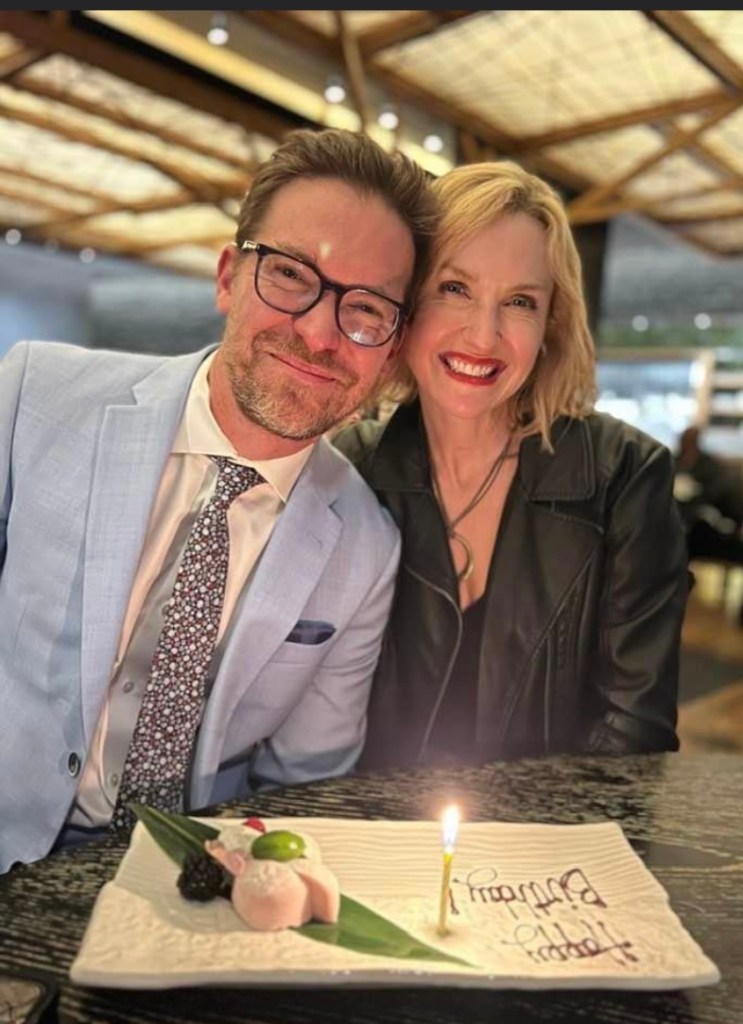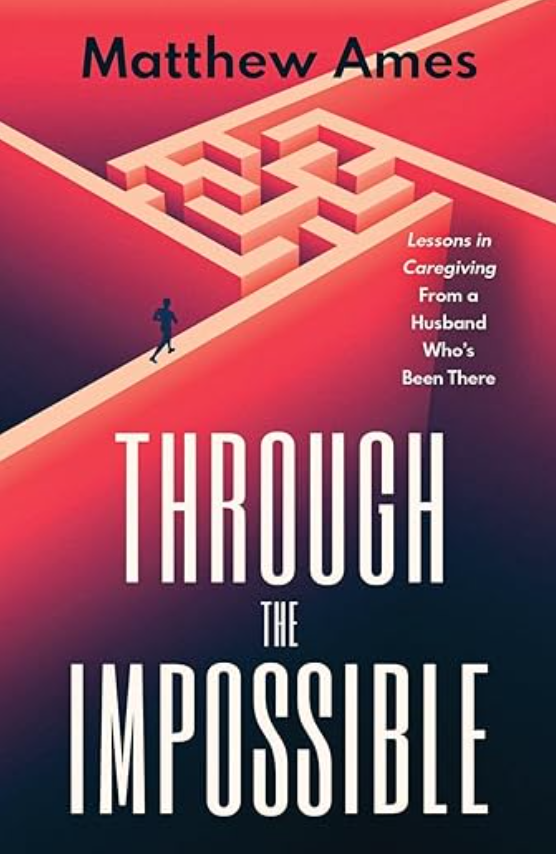What exactly is art; who defines it; who makes it, and where in Atlanta do poets, thespians, and artists congregate and create? We’ll use this space to catch up with a few for a few…some you may know; others we hope you’ll be pleased to meet their acquaintance.

In 2019, Atlanta attorney Matthew Ames received a shocking and unexpected phone call: His buoyant wife, Liz, had been diagnosed with a rare, aggressive cancer.
The Ames’ lives were turned upside down by a series of relentless tests, treatments and a surgery that nearly took Liz’s life. As Liz began to heal, Matthew realized he had taken on the role of caregiver, which he was totally unprepared for. He writes about his experience in the new book, “Through the Impossible: Lessons in Caregiving From a Husband Who’s Been There.”
When not providing legal counsel, spending time with his family, or writing about his experiences, Ames can be found running, biking, swimming, or exercising to decompress.
Ames lives in Inman Park, but as self-confessed “soccer parents,” he and Liz can be found most often on the sidelines of the Arizona soccer fields in Reynoldstown cheering on their young sons, Eli and Isaac.
Being my lovely mother’s primary caretaker during the pandemic was the most challenging thing I’ve ever had the pleasure of doing. It changed my life profoundly, and, like you, I’m motivated to share my experiences to help others avoid my mistakes and the lessons, resources, and gifts I gained along the way. Knowing a little about that world, I want to take a moment to salute you, Matt, for being a caregiver and telling your story. What was your journey from caretaker to author?
First, let me say thanks for sharing your experience as a caregiver. That shared experience is an instant bond-creator, as I have come to learn. In fact, this has been one of the most rewarding things about “Through the Impossible” – forging new connections with others. The book has provided a pathway for others to find me and share their stories. And it is raw, stirring stuff.
To answer your question about the how and why, I didn’t follow a linear process with the development of Through the Impossible. It began with an inward-looking exploration, not as a journal or “we should put this out there” content. I just started writing. It’s always been an effective way to process difficult or complicated feelings. I generated a ton of written content during the first few years of our journey.
After carefully considering it, Liz and I decided to put our story out there. For a whole host of reasons—whether it is driven by guilt or not wanting to seem obtuse or whatever it is—caregiving is one of those topics that doesn’t get talked about enough. But that silence is a serious problem that can lead to a genuine feeling of loneliness for someone unexpectedly thrust into the role. It certainly felt that way for me. We wanted to give a voice to all this. And hopefully, it will provide a little comfort and support to others going through it.
In part two of your book, you share many great pieces of advice based on your experience as a caretaker for Liz. Can you share the top 5 lessons you’d offer to readers on a journey to caretaking?
Number one: As counterintuitive as it may sound, a caregiver must first take care of oneself emotionally and physically. You have to save a little of yourself to avoid burnout and help others in the long run.
Number two: Be super-vigilant with how you use your time; it is our most precious commodity.
Number three: Make the most of your time by setting boundaries and saying “no” to things. This is the best way to get the most out of tips one and two.
Number four: Be thankful and focus on the positive. This may sound trite or privileged, but everything ultimately comes down to how we see it. Being a caregiver to Liz is the greatest gig in the world because I get to stand by her side. I always remember that every minute we have together as a family is a blessing.
Finally, number five is that it helps to have faith. Though it’s worked well for my family, it doesn’t have to be within the framework of organized religion. Regardless of how you experience and express it, faith matters. Because at least in our experience with Liz’s disease, the science sometimes runs out of answers. We will probably never know for sure how any of this happened. Or that it is all really behind us for good. That’s when we lean on our belief that there is a greater benevolent power out there and that things will still be OK.
John W. James, one of the authors of “The Grief Recovery Handbook,” is quoted as saying, “Grief is the conflicting feelings caused by the end of or change in a familiar pattern of behavior.” In the book, they illuminate grief and its variations beyond death, e.g., loss of a job, divorce, marriage, legal problems, financial changes, and significant health changes. I experienced levels of grief throughout this process, and I recognized some grief in my mother as her mind started shifting or she started “traveling” (what she called her memory lapses early on.). As a poet, I try to exorcise grief through language. Caretaking is a definite art form. How did/do you navigate the intersection of the art of caretaking and grief?
A couple of things here. First, the process of writing “Through the Impossible” was therapeutic in its own right. I had to re-live some tough moments, absolutely. But I’ve taken comfort in the lessons I learned along the journey. And to be clear, there were hard, painful lessons. But there is a reward to coming out of that on the other side. As I say in the book, sometimes, when walking in the dark, you can cover more ground than you realize.
Second, it goes back to the faith and gratitude pieces above. If your heart can lead you to it, there is real beauty in seeing your time as the fragile, precious commodity it is. Several times over a given week, Liz and I will pause to reflect to say “thanks,” even for the seemingly trivial everyday stuff. Carrying that perspective around with you is a game-changer.

The caretaking journey is life-altering in many ways; what is one major thing that has changed in you or about you that surprised you or has become an unexpected gift?
There’s so much I’ve had to let go of that I haven’t really missed. Or at least not missed as much as my younger version would have expected. Everything turned upside down for us the moment Liz was diagnosed, and all of our priorities were redirected. That old pre-caregiver version of me is gone and probably gone for good. But we now live with a sense of purpose and urgency. And with more significant emotions, too, without feeling weird about it. There is a beauty I don’t think I would have expected.
Now that you’ve completed “Through the Impossible,” what’s next?
I’m so glad you asked! First and foremost, the work still needs to be completed. Liz and I want this to be about something more. It is not a destination but a first step towards reaching out to others, making them feel seen, and starting a dialogue. So, while it’s great that the book is out there, the next important step is finding other caregivers who may need the support. The plan is to do everything we can to put this out there: book fairs, speaking engagements, social media, all of it. Even in the few short months since the book was released, we’ve seen it carry to pretty distant shores. We’re excited about the possibilities from that.
Beyond that—who knows? Many other layers and angles exist to caregiving and living with rare disease’s overhang. We wanted to keep Through the Impossible focused because it is intended to be more of a caregiving guide and less about Liz and me per se. Still, as time marches on, we’re starting to think about some other threads – how Liz’s disease changed our approach to parenting, what it means for us professionally, and other topics we didn’t explore in the book. We’ve toyed with the idea of writing something in tandem, almost like a patient/caregiver dialogue in written form. As a newly published author (still getting used to saying that), I’ve learned that once you start scratching that itch of writing, it only makes you want to write more.
Another way Ames unwinds is through music. Check out his Spotify caregiver playlist:
